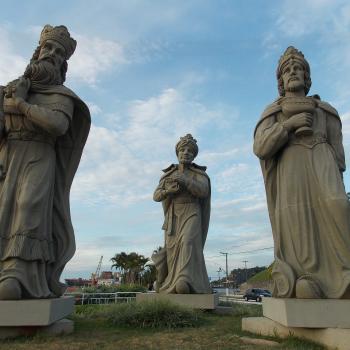There is some weird comfort in the fact that most heresies are old ones. For the most part, if we arm ourselves with the teachings of scripture and the Church, we’re fairly able to lift up the carnival masks of new strange teachings and find the faces of quite familiar challengers. A weird comfort, perhaps, but no great assurance, for the truth is that most of us are entertained and delighted by the fresh appearances of old heresies, and they have the same charm and allure that they had in the first place.
[Aside: Sometimes, however, heresies resurrect without any pretense of a mask. I am fascinated that Pelagianism, an ancient heresy firmly rejected by the Church as untrue to the gospel of Jesus Christ, has a contemporary defender. John Philip Newell, of whom many I know speak highly because of his warm and appealing Celtic spirituality, rehabilitates Pelagius and Pelagianism in his Listening for the Heartbeat of God.
It’s not hard to rehabilitate Pelagius. Most heretics of the ancient world weren’t aiming at being heretics. They were for the most part just trying to answer questions that the Church had not answered well, and their answers, after being vetted by the Church as it weighed them in light of the Gospel, were found to be contrary to Christian teaching and thus rejected. The heretics themselves, however, as acerbic as they might have been, never had horns, breathed out no fire, didn’t aspire to the destruction of Christianity, and generally struggled like the rest of us with understanding, obedience, and vision. Rehabilitating Pelagianism, however, is another issue altogether. There is a reason his teaching was condemned in 418. If I write any more, this will be an article on Pelagianism, but that’s for another day.]
In her powerful and capacious inquiry into historical understandings of the death of Jesus Christ, The Crucifixion, Fleming Rutledge begins, rightly so, with the primacy of the Cross. She explores its symbolism, its role in the gospels, and its scandal in the life of Christ. As she does so, she also identifies challenges to the message of the Cross in the world today, the greatest of which is Gnosticism. Here, then, is another contemporary version of an ancient heresy.
Rutledge introduces Gnosticism and its connections with knowledge, particularly spiritual knowledge, as “far and away the most pervasive and popular rival to Christianity” (p45). Recognizing the complexity of this philosophy, she offers some basic information, and summarizes thus: “All the various forms of gnosticism are grounded in the belief that privileged spiritual knowledge is the way of salvation” (p46, emphasis original). Unlike Jesus’ teaching, which was meant for all the world, a universal message of the way of salvation, Gnosticism plays on the esoteric idea that only “the wise,” the spiritually attuned elite, really understand, really know spiritual truth. “Gnostics are mystery-mongers; they claim to know things that other people don’t know” (p47).
And at this point, Rutledge offers a footnote.
[Another aside: I have a footnote fetish and compulsively read all footnotes. Rich, meaty footnotes are a delight, and Rutledge serves them up regularly. So, for all you obsessive detail freaks out there, this is a bonus aspect of the book.]
So, in note 10 of chapter one, Rutledge writes this: “Many popular Christian speakers and writers mine the theme [of privileged spiritual knowledge]. Richard Rohr, for instance, habitually refers to the ‘deeper wisdom teaching’ of Jesus that is the ‘goal of religion,’ the ‘contemplative seeing’ that is ‘so important for anyone on a serious spiritual journey.’ This is typical gnostic language, quoted from Rohr’s own publicity material.”
Then, after some discussion about spirituality in the late 20th-century, a spirituality more fixated on social engagement, she offers note 23: “The appeal of gnostic spirituality pervades much theological education today. During the late ’60s and early ’70s, life in the liberal seminaries—especially the interdenominational ones—was dominated by the call to revolutionary social action. … The suddenness of this change from social action and liberation theology to spirituality has been enormously confusing to faithful Christians who are served a smorgasbord of enneagrams, labyrinth-walking, and all things Celtic, with a heavy dose of the Jesus Seminar mixed in. Classical and biblical Christianity is lost in this unmoored environment.”
These two footnotes stopped me cold. I have no plan here to discuss any of these particulars that she names: Richard Rohr, the Enneagram, labyrinths, Celtic spirituality, or the Jesus Seminar. My guess is that for those of you reading this, some of these fall in the category of “inspirational and empowering,” while perhaps you marginalize the Jesus Seminar reference and wonder how she can throw them all together into the same pot. I’ve read Rohr, I’ve got my Enneagram number down, I’ve walked the labyrinth, I’ve prayed Celtic prayers. The question is not whether there’s anything useful in any of these resources, but whether we know how to think about them.
My reflection here is on that last sentence: “Classical and biblical Christianity is lost in this unmoored environment.”
Unmoored. The image calls up a boat whose anchor has slipped, and the current has set it adrift. For Rutledge, then, “classical and biblical Christianity” is “moored” Christianity. What anchors our souls in authentic Christian faith, as it has been passed down through scripture and the apostles’ teaching?
Instead of adding my own commentary on this or providing more of Rutledge’s, I’ll just pose twelve “classical and biblical Christianity” questions that might help us explore whether our faith is moored or unmoored. These are not in any order of importance, and I’m fully aware that one or more might be disputed or nuanced differently. Nevertheless, when I study the history of Christianity, the teachings of the Church, and, most importantly, the Holy Scriptures, this is what comes to my mind:
- Is my Christian faith based on the Cross, the objective work of God in the life-death-life of Jesus Christ, for the salvation of the world? Or is it based on right doctrine, right behavior, right feeling, or right affiliations?
- Do I regularly read and meditate on the scriptures? Or do I prefer easier fare—like short devotional readings, inspirational commentary, encouraging Christian self-help books, stirring podcasts, and praise music—and rarely, if ever, spend time actually reading the Bible?
- Am I a faithful member of a Christian community that practices Holy Communion and Baptism? Or am I a church “dilettante,” dabbling here and there with “going to church” and looking for inspiration more than a practice of corporate worship?
- Do I engage in regular prayer, trying to develop a real relationship with God through habits of adoring him and presenting before him the needs of those whose lives are linked with mine? Or do I tend to treat God as the “divine butler” and “cosmic therapist” who’s there when I need him, but who otherwise has few real expectations of me?
- Is my vision of the Kingdom of God primarily one of ministry and service or privilege and security?
- Is my faith Trinitarian, recognizing the God whose very nature is self-giving in love?
- Do I really think deep down that right behavior and true doctrine are essentially different matters? That orthodoxy is less important than orthopraxy?
- Do I find myself being more optimistic or pessimistic about the Kingdom of God depending on who is in the presidential office, or who is on the Supreme Court, or how threatened Christianity is in cultures around the world?
- Do I worship and love Jesus Christ as the Risen Lord?
- Do I recognize that “there is no calamity but Sin alone” (Thomas Traherne) and practice repentance as a way of life? Or do I think that God’s forgiveness and grace are really just a carte blanche for living way I think I’m entitled to live?
- Do I acknowledge that the word “love” in the Christian faith doesn’t mean whatever feels right, but has actual content connected with the self-denying identity of God?
- Do I really yearn for the fullness of the Kingdom of God, the “home of God among mortals,” and pray and long for Jesus’ return?
I take great pains, when I teach in the area of Christian Formation, to be honest with students about the rigor of the Christian journey. These questions don’t constitute a checklist of “how to get it right” in the Christian life, but rather may serve as reminders that Jesus’ teaching is indeed difficult (Jn 6.60), that the way of Jesus takes us to the Cross (Mk 8.34), and that our salvation must be worked out with fear and trembling (Phil 2.12). The idea isn’t to do it all perfectly, but to be headed in the right direction. I fear that a lot of us out there are adrift on a spiritual sea of Christianish fads, gurus, techniques, and simplistic and shallow models of faith—tossed to and fro and blown about by every wind of doctrine (Eph 4.14).
(For further reading, I suggest my series on “Six Neo-Christian Myths: Exiting the Arc of Christian History.”)
Image by DarkWorkX from Pixabay














